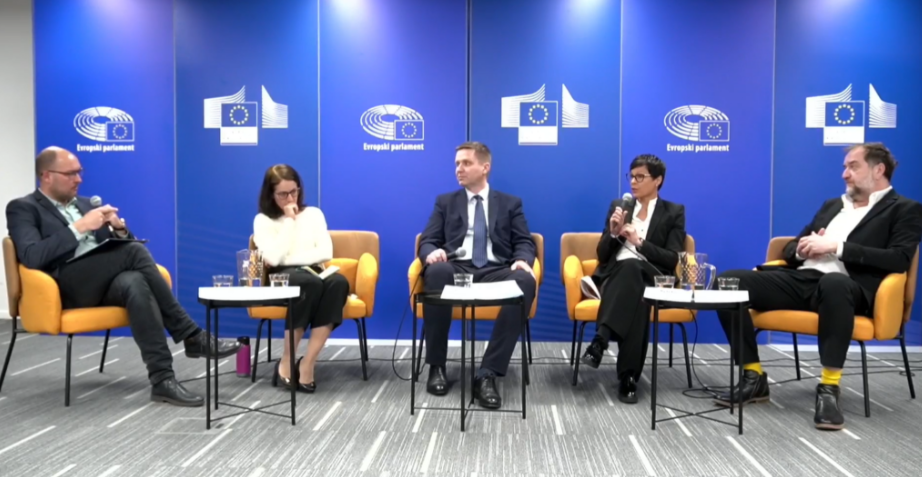On the day when the President of the Republic, Nataša Pirc Musar, signed a decree calling for the elections of Slovenian MEPs to the European Parliament, which will happen on the 9th of June, the House of the European Union, which brings together the European Parliament Office in Slovenia and the Representation of the European Commission in Slovenia, organised a discussion called “100 days to the European elections.” However, it was unable to ensure a balanced set of speakers. As Aleš Hojs, who was present in the audience at this year’s debate, pointed out, the speakers could not get through even one event without a mention of the opposition leader Janez Janša and the smearing of his name.
“This year, more than half of the world’s population will have the chance to vote, including over 400 million Europeans at #EUelections24. We have 109 exciting days of campaigning ahead of us, starting on Friday with a conversation at #StudioEurope,” wrote the profile of the European Parliament in Slovenia ahead of the debate, which featured Marta Kos, President of the ONA VE – SHE KNOWS Association, Dr Sabina Lange from the Centre for International Relations at the Faculty of Social Sciences, who also works as a lecturer at the European Institute of Public Administration, Igor Zorčič, Director of the State Election Commission (DVK), and Andraž Zorko, founder and Director of Valicon, a marketing consulting and research company.
Nobody made sure to find a balanced set of speakers
“Very telling participation in the discussion on the European Parliament in Ljubljana. If I take away the director of the State Election Commission and the professor from the Faculty of Social Sciences, we are left with Marta Kos from the left-wing “non-governmental” SHE KNOWS, and the left-wing political propagandist-creator of public opinion, Andraž Zorko,” Aleš Hojs, a candidate for the European Parliament elections from the Slovenian Democratic Party (Slovenska demokratska stranka – SDS), was critical of the debate, adding that European Union officials do not even try to balance the participation in the debate.
The debate, moderated by Radio Slovenia’s Aleš Kocjan, highlighted, among other things, the problem of low voter turnout in Slovenia, according to the Slovenian Press Agency (STA). According to Zorko, the turnout in European elections is so much lower than in national elections because there are no tactical voters in European elections. However, he also said that it was possible that, due to the younger voters from the so-called Generation Z, turnout could be higher this time than it was in the past. Similarly, Kos said that “young people nowadays are realising what a threat to democracy really means.” “Interestingly, according to the Eurobarometer, confidence in the EU, as measured in Slovenia, has always been higher than confidence in domestic governments. This was particularly evident during the reign of Janez Janša,” Kos pointed out, adding that this is also evident now, under the government of Robert Golob.
Those who should be making decisions are not making them
The discussion was also attended by Hojs, who pointed out in the question and comment period that he had not expected to hear about Janša on this occasion, but Kos did not disappoint this time either. Among other things, he also pointed out that what is happening at national levels, and especially in Slovenia, is also happening in Europe – namely, that those who should be making decisions are not making them, but the second, third line is making them.
“It is European officials who should be making the decisions, not Commissioners. To a large extent, the European Parliament still has the power to decide, so it is very important who we elect to the European Parliament. You know the procedure, you know the trialogues, you know how decisions are made. The European Parliament speeds something up or stops something. Therefore, the fears of those who are worried about who the European People’s Party (EPP) – which will, in my assessment, remain the largest party in the European Parliament – will cooperate with in the future, are justified for the left parties,” Hojs stressed, noting that the discussion itself proved that it is the left officials who make the decisions. According to Hojs, the delusions of the green transition, LGBT ideologies, and ideological commissioners are on their way out.
N. Ž.


